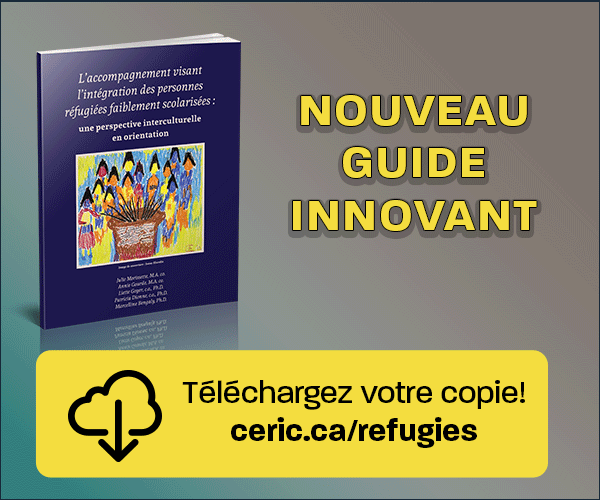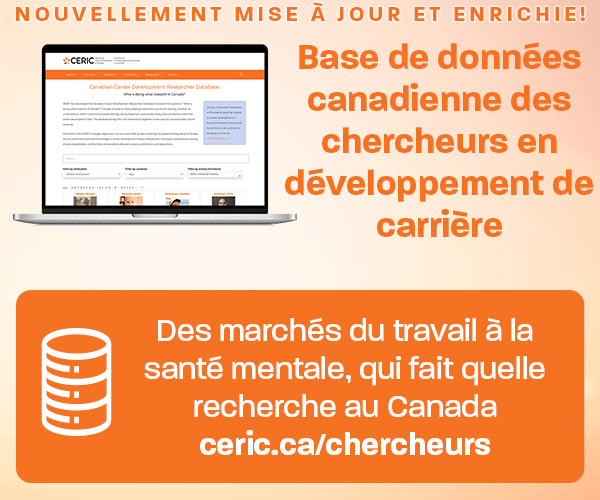Un modèle pour la formation des conseillers en orientation au Canada
Mots-clés :
modèle, éducation, carrière, praticiens, professionnels du secteur, canadaRésumé
Most professions dictate the educational levels needed, first to access and then to advance within them. That is not the case for the relatively young field of career development in Canada, where such requirements are absent everywhere but in the Province of Québec. The following article presents an educational framework developed through a Canada-wide consultative process that proposed educational benchmarks for various scopes of career development practice. Five core functions were identified and defined: career advising, career educating, career counselling, career coaching, and career consulting. Moreover, several leadership functions integral to the field’s performance and advancement were identified: innovation, education, supervision of practice, systemic change, and management. Ultimately, the framework will help promote quality of service, professional identity, and professionalism in the career development field. Recommended next steps include generating a wellintegrated curriculum map to promote program and individual practitioner development.
Références
Arthur, N., Collins, S., McMahon M., & Marshall, C. (2009). Career practitioners’ views of social justice and barriers for practice. Canadian Journal of Career Development, 8(1), 28–29.
Borgen, W. A., & Hiebert, B. (2002). Understanding the context of technical vocational education and training. In B. Hiebert & W. Borgen (Eds.), Technical and vocational education and training in the 21st century: New roles and challenges for guidance counselling (pp. 13– 26). Paris: United Nations Education, Scientific, and Cultural Organization.
Borgen, W. A., & Hiebert, B. (2006). Youth counselling and career guidance: What adolescents and young adults are telling us. International Journal for the
Advancement of Counselling, 28, 389–400.
Brain, S., & Austin, J. (2002). Coaching and counselling: What is the connection? Insights, 13(3). The Newsletter of the BC Association of Clinical Counsellors.
Burwell, R., & Kalbfleisch, S. (2007). Deliberations on the future of career development education in Canada. Canadian Journal of Career Development, 6(1), 40–49.
Furbish, D.S. (2003, October). Considerations about the professionalization of New Zealand career practice. Presentation conducted at the Third Biennial Conference of the Career Practitioners Association of New Zealand, Auckland, New Zealand.
Gilbert, D.T., & Malone, P.S. (1995). The correspondence bias. Psychological Bulletin, 117(1), 21– 38.
Kalbfleisch, S., & Burwell, R. (2007). Report on the Canadian Career Counsellor Education Survey. Canadian Journal of Career Development, 6(1), 4–20.
Kilminster, S.M., & Jolly, B.C. (2000). Effective supervision in clinical practice settings: A literature review. Medical Education, 34, 827–840. Papers from the 9th
Cambridge Conference.
McCarthy, J. (2004). The skills, training and qualifications of guidance workers. International Journal for Educational and Vocational Guidance, 4, 159–178.
Niles, S.G., Engels, D., & Lenz, J. (2009). Training career practitioners. The Career Development Quarterly, 57, 358–365.
Ross, L., & Nisbett, R. (1991). The person and the situation: Perspectives of social psychology. New York: McGraw-Hill.
Sargent, B. (1999). An examination of the relationship between completion of a prior learning assessment program and subsequent degree: Program participation, persistence, and attainment. Unpublished doctoral dissertation, University of Sarasota, Florida.
Shields, Patricia M. (1998). Pragmatism as a Philosophy of Science: A Tool for Public Administration. Faculty Publications-Political Science. Paper 33. Retrieved November 22, 2009, from . (Reprinted from Jay D. White (Ed.), Research in Public Administration, 4, 195-225, 1998.)

Téléchargements
Publié-e
Comment citer
Numéro
Rubrique
Licence

Cette œuvre est sous licence Creative Commons Attribution - Pas d'Utilisation Commerciale - Pas de Modification 4.0 International.











